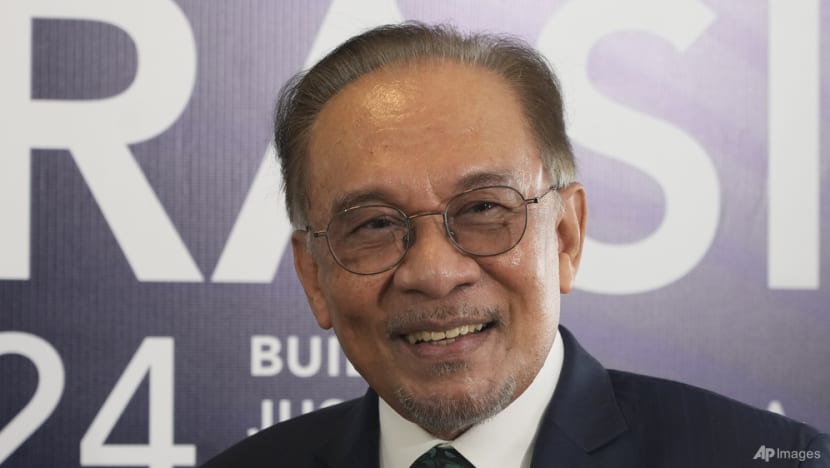Commentary: After two years as Malaysia’s PM, it’s still hard figuring out who the real Anwar Ibrahim is
When Anwar Ibrahim was sworn in as Malaysia’s prime minister two years ago on Nov 24, many critics doubted he would last very long. He’s still here, but questions remain about who the real Anwar is, says Asian Studies professor James Chin.


This audio is generated by an AI tool.
HOBART: Two years. Anwar Ibrahim has now been Malaysia’s prime minister for two years.
When he was sworn in as Malaysia’s 10th prime minister on Nov 24, 2022, many critics doubted he would last a year, given the country’s turbulent politics. After all, Anwar did not win the election, but was asked by the King to form a coalition government because there was no clear winner.
His decades-long journey to power has been nothing but bumpy, marked by two stints in jail that Anwar has long maintained were politically motivated.
Yet, as he completes his second year in office, Anwar has already outlasted all three of his immediate predecessors, whose tenures were prematurely ended.
Still, questions remain about the man in the prime minister’s seat.
Is he the reformer he claimed to be before becoming prime minister, or is he a closet Islamist pushing an agenda now that he is in power?
Simply put, he could be both. But there is also a third explanation.
THE REFORMER
Ever since Anwar was sacked from his posts of deputy prime minister and finance minister in 1998 after a bitter fallout with then prime minister Mahathir Mohamad and subsequently tried for corruption and sodomy and thrown in jail for the first time, his watchword has been "reform".
His People’s Justice Party (PKR) has always been committed to reforming Malaysia into a more democratic country. This is most clearly shown by the party's logo - a depiction of a "black eye", inflicted on Anwar in prison by Malaysia’s then police chief Abdul Rahim Noor.
Anwar’s years in prison strengthened his belief that radical reforms were needed to transform Malaysia's political system into a model of democracy for Muslim countries. In fact, he is often presented as a "Muslim democrat", a type of Islamic leader who can blend the main principles of Western democracy with political Islam.
Anwar has frequently spoken about the compatibility of Western ideas of human rights and democracy with Islamic law in his public speeches. He gained admiration not only by Western countries, but also from non-Malay politicians in Malaysia who saw him as a leader capable of steering Malaysia back to the centre after years under Dr Mahathir and UMNO.
There were hopes that if he came to power, he would undo the excesses of the previous government.
In the 2022 general election, the Democratic Action Party (DAP), the Chinese wing of Anwar's coalition government, won 90 per cent of the Chinese vote, in part because the Chinese community viewed Anwar as the only Malay leader who could reform the political system.
THE ISLAMIST
Since then, however, Anwar has faced growing criticism from many Malaysians, particularly for actions that some view as increasingly aligned with Islamist policies.
Key to this discontent are his strong stances on issues like the Palestinian cause and his support for the Mufti (Federal Territories) Bill, a controversial piece of legislation that would give religious authorities unbridled powers without parliamentary oversight.
A fatwa is a religious edict or formal ruling on Islamic law, and it is binding on Malaysian Muslims. Currently, fatwas can be legally binding in Malaysia if they are gazetted by the relevant state governments or federal territories.
Under the proposed Bill, however, fatwas issued by the FT mufti cannot be challenged in court. Critics warn that this could lead to punishments for actions that are not criminalised under the country’s secular law. It would also give power to the government, through the mufti, to police nearly every aspect of Muslim life in Malaysia.
A further concern is that the Bill will set in law that only a person belonging to certain streams within the Sunni school of thought can hold the position of FT mufti. There are fears this will marginalise non-Sunni sects and make Malaysia into a de facto theocratic state in the long run as other states adopt the same legal framework as the FT Mufti Bill.
This would leave no room for alternative streams of thought. There are some who argue that the real target of the Bill is the Shia movement in Malaysia, which has been gaining strength and followers in the past decade. Many of the top Sunni clerics in Malaysia support this Bill.
The Bill is in its final stage in the Malaysian parliament and thus far, the mounting opposition has had no effect. Critics argue that Anwar may delay the Bill but will proceed with it later.
Some Muslims and non-Muslims are concerned that if the Bill is passed, Islamisation will accelerate to the next level.

Another issue that worries many is Anwar’s announcement that the Malaysia’s Islamic Development Department (JAKIM) be involved in all aspects of public policy. JAKIM used to be mostly concerned with the administration of Islam in the country. For example, if JAKIM intervenes in financial matters, it is feared that Malaysia's large non-halal industry will suffer.
There are also concerns that Anwar's high-profile crusade for Palestine may harm Malaysia internationally. His request for Israel's expulsion from the United Nations contrasts sharply with Malaysia's previous actions.
Malaysia typically collaborates with other Muslim nations to diplomatically isolate Israel and use the UN to condemn it. It has never previously called for Israel's expulsion from the United Nations. Even China and Russia, permanent members of the UN and critics of Israel’s actions in Gaza, has not called for Israel to be expelled.
OR THE OPPORTUNIST?
The third explanation is that Anwar is simply doing whatever is necessary to ensure that he wins a second term.
Again, one must not forget that he did not win the last general election; he was selected by the King to form a “unity government” and he did it by forming a coalition with UMNO and the Borneo parties.
The big test for the coalition was the six state elections held last August and they failed. The majority of the Malay vote went to the opposition Perikatan Nasional (PN), in particular PN’s Parti Islam Se-Malaysia (PAS). For example, PN managed to win 100 per cent of the seats in Terengganu.
Thus Anwar’s swing towards the religious vote is simply a matter of political survival and his current political manoeuvre is simply to ensure that he can get enough seats to win the next general election (GE16).
GE16 is due in 2027, but most believe it will be held much earlier.
TURN TO THE RIGHT
In some ways, it does not matter who the real Anwar is simply because the needle of Malaysian politics has moved significantly to the right.
The middle ground for Malaysian politics is no longer a tolerant multiracial Malaysia but a conservative Malaysia with an Islamic outlook. The fear is that this will lead to sectarianism never seen before in Malaysian history and split the Muslim population more.
The real tragedy of Anwar is that his “Muslim democrat” approach will bite the dust of history, and no other young Malaysian Muslim leader would dare to return Malaysia to the centre ground in the future.
Under Anwar, Malaysia is getting more and more polarised along religious lines and Anwar’s position on political Islam may just move the country to uncharted territory.
Nonetheless, there is hope that Anwar's political manoeuvres are aimed at winning big in GE16, which will provide him with the political capital needed to return the country to the moderate road.
James Chin is Professor of Asian Studies at the Asia Institute Tasmania, University of Tasmania. He is also a Senior Fellow at the Jeffrey Cheah Institute on Southeast Asia and adjunct professor at Monash University.




















